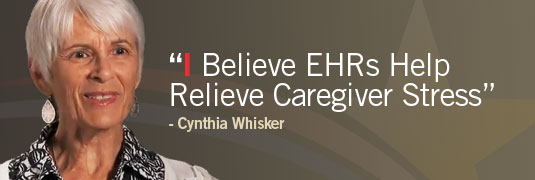Cynthia Whisker


“I Believe EHRs Help Relieve Caregiver Stress”
Cynthia Whisker spends her days as a social service coordinator, counseling families and seniors about how to handle the stress of caregiving for their loved ones. And when she gets home, she walks the walk in her role as a caregiver for her husband who underwent both a liver transplant and heart bypass surgery within the past three years. Cynthia conveys how health information technology (health IT) has played a critical role in her success as a caregiver and in helping manage caregiver stress.
Unbeknownst to me, when I took a work course several years ago about “how to communicate with your doctor,” this was preparing me, not just for my job, but for the role I would play as a caregiver for my husband.
I counsel families every day as part of my job about the stresses that come with caregiving of a loved one, but I was given a whole new perspective when I found myself in the position of caregiver twice in the last three years – first with my husband's liver transplant, and most recently, following his emergency heart bypass surgery.
EHRs Help Coordinate Care
Following my husband's transplant surgery three years ago, electronic health records (EHRs) were a blessing in helping me and his many providers coordinate his care. When he was hospitalized with liver problems, it was such a comfort to me to know that every doctor, every nurse, every physical therapist updated his hospital EHR whenever they saw him. His liver doctor could monitor what was going on even when she wasn’t present. In fact, my husband’s primary doctor found out about the transplant through the hospital’s EHR, then stopped by to see us. This huge medical team seems smaller, less overwhelming, because they’re all interconnected by this wonderful electronic network.
Then when we went home from the hospital, it was so helpful to have all the instructions and medications printed out for me from the EHR. We had to keep daily charts – weight, blood pressure, blood sugar, temperature. His medical team scanned our charts into the EHR during our office visits, so everything was in one place. And that was three years ago.
Shortly after returning home following his transplant surgery, my husband suddenly spiked a fever. I called his doctor, and she said to go to the hospital right away. Here is where the EHR really saved the day. When we got to the emergency room, everyone had seen the flag in his EHR that he needed to be isolated, because of the immunosuppressant drugs from the transplant. They whisked us right into a private room, so he wouldn’t be exposed to other patients in the ER. All the logistics in the hospital went so efficiently because his providers had immediate access to my husband’s EHR. That means a lot when you’re in the middle of a crisis like that.
It has always been a comfort to me to know that even if my husband had to go into the hospital without me, they would know everything because they could just pull up his EHR.
Accessing EHRs During an Emergency
This past summer, we were vacationing in St. Augustine, FL. We were enjoying an afternoon on the balcony, overlooking the ocean. Suddenly, my husband started having a terrible pain in his chest. He took an aspirin. I dialed 911. He went in the ambulance, and I followed in the car. By the time I got to the hospital, his medical team had already logged him in and was administering care. The next day, he had heart bypass surgery.
I was happy to see that the Florida hospital also uses EHRs. The medical staff kept track of everything constantly – everyone working on their electronic devices to coordinate his care and to log the latest health information into his EHR.
Because my husband is a liver transplant recipient, coordination of care with his doctors back home was critical. While the doctors treating him in Florida and his home doctors back in Delaware both have EHRs, their systems can’t currently communicate with each other. As a result, the Florida doctors had to phone his home doctors, and there was a lot of back-and-forth about what drugs my husband could use that wouldn’t interact badly with his transplant medications.
It would have really closed the gap and made coordination of care so much easier if the Florida hospital and his providers back home could have connected electronically. It was Labor Day weekend, so there was a little delay waiting for call-backs. That type of electronic coordination would have been so helpful in managing his care.
Because we wanted to make sure my husband’s regular providers back home had the very latest information about what transpired in Florida, we took printouts of his electronic records back home of everything that happened in Florida, including all the doctors’ notes. We were then able to pass those records along to his Delaware doctors – including the new cardiologist we began seeing at home, who will be closely monitoring his recovery – so they could input the information into my husband’s EHR.
When you’re away from home, and you have an emergency like this, it means a great deal to know that all the doctors are in touch with each other. If EHRs can make that happen even faster, well that’s a great use of technology.
Managing Caregiver Stress
Taking on the role of primary caregiver for my husband throughout the past three years has given me new responsibilities for monitoring his progress, but I’ve learned that it’s also important to focus on my own health and manage my caregiver stress. The use of EHRs makes my job as his caregiver and co-pilot for all doctor’s appointments so much easier. The availability of these electronic records from doctor to doctor and from office to office has made this often highly stressful caregiving situation so much easier.
I offer a few tips to ease caregiver stress and best prepare for medical emergencies:
- Carry a Medication List: EHRs allow you to print your medication lists and dosages, which can be critical if you run out of your prescription while away from home – like I did. We were planning to stay in Florida for just two weeks, but that turned into five weeks following my husband’s heart bypass surgery. I didn’t bring enough medication for our unexpectedly longer stay in St. Augustine, and I had just refilled my prescriptions at home so I had trouble refilling them again. And because I didn’t carry my prescriptions in their original containers, it was hard to recall the exact dosages I needed for the emergency refills.
- Carry Copies of Medical Records: Because of my husband's serious medical condition resulting from his liver transplant, I now understand the need to carry a copy of his extensive EHR with us when we travel.
Facing situations like my husband’s transplant and bypass surgery can be so emotionally stressful, and something as simple as EHRs can help so that I don’t feel like things are spinning out of control or that there is just too much to keep track of in managing his care.
I look at caregiving from every side. I want people who come to me for assistance to know that health IT can make a world of difference in the care of their loved one. I’m able to walk this journey with my clients because I’m walking it myself – and at the end of the day, we all just want the best care possible for our loved ones – and health IT helps to ensure that.

